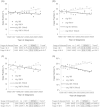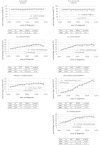Increasing late stage colorectal cancer and rectal cancer mortality demonstrates the need for screening: a population based study in Ireland, 1994-2010
- PMID: 24884929
- PMCID: PMC4041914
- DOI: 10.1186/1471-230X-14-92
Increasing late stage colorectal cancer and rectal cancer mortality demonstrates the need for screening: a population based study in Ireland, 1994-2010
Abstract
Background: This paper describes trends in colorectal cancer incidence, survival and mortality from 1994 to 2010 in Ireland prior to the introduction of population-based screening.
Methods: We examined incidence (National Cancer Registry Ireland (NCRI) and mortality (Central Statistics Office) from 1994 to 2010. Age standardised rates (ASR) for incidence and mortality have been calculated, weighted by the European standard population. Annual percentage change was calculated in addition to testing for linear trends in treatment and case fraction of early and late stage disease. Relative survival was calculated considering deaths from all causes.
Results: The colorectal cancer ASR was 63.7 per 100,000 in males and 38.7 per 100,000 in females in 2010. There was little change in the ASR over time in either sex, or when colon and rectal cancers were considered separately; however the number of incident cancers increased significantly during 1994-2010 (1752 to 2298). The case fractions of late stage (III/IV) colon and rectal cancers rose significantly over time. One and 5 year relative survival improved for both sexes between the periods 1994-2008. Colorectal cancer mortality ASRs decreased annually from 1994-2009 by 1.8% (95% CI -2.2, -1.4). Rectal cancer mortality ASRs rose annually by 2.4% (95% CI 1.1, 3.6) and 2.8% (95% CI 1.2, 4.4) in males and females respectively.
Conclusions: Increases in late-stage disease and rectal cancer mortality demonstrate an urgent need for colorectal cancer screening. However, the narrow age range at which screening is initially being rolled-out in Ireland means that the full potential for reductions in late-stage cancers and incidence and mortality are unlikely to be achieved. While it is possible that the observed increase in rectal cancer mortality may be partly an artefact of cause of death misclassification, it could also be explained by variations in treatment and adherence to best practice guidelines; further investigation is warranted.
Figures






References
-
- GLOBOCAN. IARC Section of Cancer Information (Cited:(17/12/2012) 2008. Available at: http://globocan.iarc.fr.
-
- PDQ® Cancer Information Summary. Colorectal Cancer Screening—Health Professional. Date last modified: 09/30/2011. Bethesda, Maryland: National Cancer Institute; 2011.
Publication types
MeSH terms
LinkOut - more resources
Full Text Sources
Other Literature Sources
Medical

